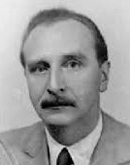

Luigi Piccinato
*30. 10. 1899 – Legnago, Italy
†29. 7. 1983 – Rome, Italy
Biography
Luigi Piccinato was an Italian architect and urban planner. He graduated in architecture from the University of Rome La Sapienza in 1923 and from the early years, he dedicated himself intensely to pedagogical and professional activities, particularly in the field of urbanism. His deep knowledge of the historical matrices of territory allowed him to intervene with rare balance in the fragile structure of numerous urban centers in Italy: from Brescia to Matera, from Naples to Rome, his analyses and forecasts always proved to be prophetic, just as his reputation as a great urban planner led him to solve prestigious international problems.
His historical knowledge enabled him to intervene with rare balance in the fragile structure of many Italian urban centers: from Brescia to Matera, from Naples to Rome, his analyses and forecasts always proved to be prophetic, just as his reputation as a great urban planner led him to solve prestigious international problems.
He is the author of a wide range of publications and studies in the field of urban planning, and he was invited to lead courses and conferences at a very high scientific level in many Italian and foreign cities. At the same time, he served on commissions and study committees and participated in national and international urban planning congresses.
In 1945, he founded, alongside Bruno Zevi, Mario Ridolfi, and Pier Luigi Nervi, the A.P.A.O. (Associazione Per L'architettura Organica), which promoted a type of architecture based on the work of Frank Lloyd Wright. In the same year, he co-founded the magazine Metron with Cino Calcaprina, Bruno Zevi, and others.
From 1937 to 1950, he taught at the University of Naples, then moved to the Faculty of Architecture in Venice as a full professor of urbanism, where he remained until 1963, when he transitioned to the same department at the Faculty of Architecture in Rome. He served as an emeritus professor from 1975, and his university career began in the early years of his studies with lectures on urbanism. In 1946-47, Piccinato was called to Pescara to design the general plan for the reconstruction of the city devastated by bombing. From 1956 to 1960, he served as a city councilor in Rome for the Italian Socialist Party.
Luigi Piccinato was an Italian architect and urban planner. He graduated in architecture from the University of Rome La Sapienza in 1923 and from the early years, he dedicated himself intensely to pedagogical and professional activities, particularly in the field of urbanism. His deep knowledge of the historical matrices of territory allowed him to intervene with rare balance in the fragile structure of numerous urban centers in Italy: from Brescia to Matera, from Naples to Rome, his analyses and forecasts always proved to be prophetic, just as his reputation as a great urban planner led him to solve prestigious international problems.
His historical knowledge enabled him to intervene with rare balance in the fragile structure of many Italian urban centers: from Brescia to Matera, from Naples to Rome, his analyses and forecasts always proved to be prophetic, just as his reputation as a great urban planner led him to solve prestigious international problems.
He is the author of a wide range of publications and studies in the field of urban planning, and he was invited to lead courses and conferences at a very high scientific level in many Italian and foreign cities. At the same time, he served on commissions and study committees and participated in national and international urban planning congresses.
In 1945, he founded, alongside Bruno Zevi, Mario Ridolfi, and Pier Luigi Nervi, the A.P.A.O. (Associazione Per L'architettura Organica), which promoted a type of architecture based on the work of Frank Lloyd Wright. In the same year, he co-founded the magazine Metron with Cino Calcaprina, Bruno Zevi, and others.
From 1937 to 1950, he taught at the University of Naples, then moved to the Faculty of Architecture in Venice as a full professor of urbanism, where he remained until 1963, when he transitioned to the same department at the Faculty of Architecture in Rome. He served as an emeritus professor from 1975, and his university career began in the early years of his studies with lectures on urbanism. In 1946-47, Piccinato was called to Pescara to design the general plan for the reconstruction of the city devastated by bombing. From 1956 to 1960, he served as a city councilor in Rome for the Italian Socialist Party.
The English translation is powered by AI tool. Switch to Czech to view the original text source.








